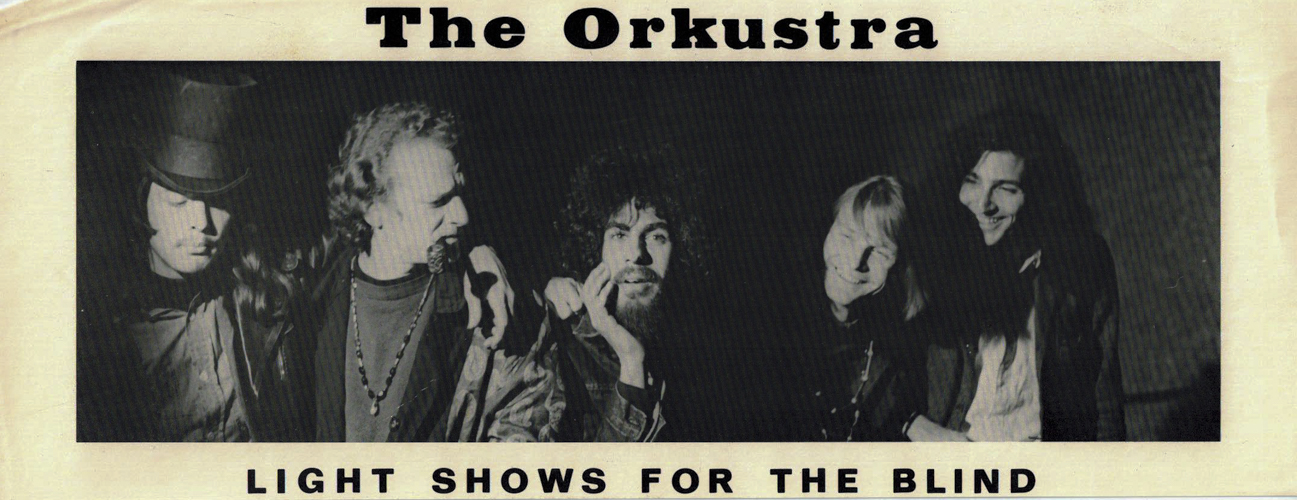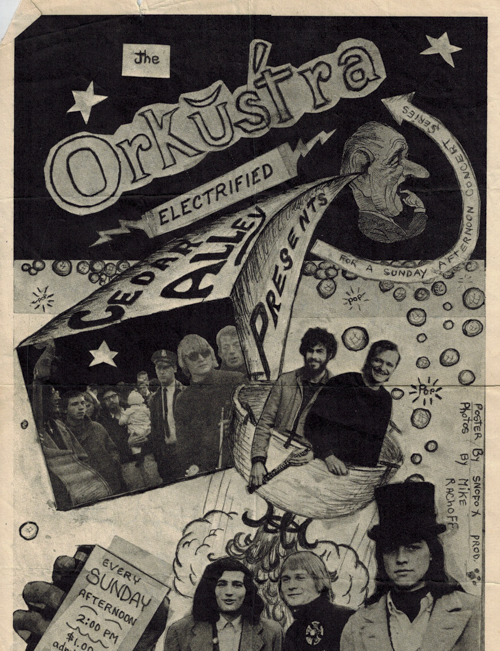The Electronic Chamber Orkustra


Some Researches into The Orkustra's History
The Orkustra (variously described as an "all electric jazz band" and
an "electronic chamber group") performed together less than a year. But
what a year it was. From September/October 1966 to July 1967. One
site provides a listing of the musicians and performances (although
a cursory search shows it to be incomplete). The original members
included Bobby Beausoleil on guitar, David LaFlamme on vocals and
violin, Terry Wilson on drums, Jaime Leopold on bass, Henry Rasof on
oboe and "Neal" on flute. The excerpt (below) from Beausoleil's history
of The Orkustra states that they were known as the "Diggers' band" but
the original Diggers have always disputed that designation. After some
research, I agree. There is much evidence of the (paid) shows The
Orkustra performed during these ten months. They were busy. Shows at The
Coffee Gallery in North Beach; later at the Cedar Alley Coffee House and
California Hall in the Polk neighborhood; the Fillmore and Avalon
ballrooms; Sokol Hall in the Haight; and various venues in Berkeley. By
comparison, their appearance at free/digger events was not so overwhelming
that they would have been considered the "Diggers' band."
Beausoleil, in the excerpt below, mentions that they played at the
first free concert organized by the Diggers on a Sunday in the
Panhandle. This was likely the New Year's Wail (which the Hell's Angels
threw in appreciation for the Diggers) that took place on
January 1, 1967. The article in the San Francisco Chronicle that
appeared the next day mentioned that "The Chamber Orkustra" was the
first band to play that day. Beausoleil mentions that they played at the
Digger free concerts "several times" and though that may be correct, so
did the Grateful Dead and Big Brother and Steve Miller and other bands.
The other named event that Beausoleil mentions is the Invisible
Circus on February 24 1967 (which was a collaboration of several groups
including the Artists Liberation Front, the Diggers, Communication
Company, and others). Beausoleil's account, of playing rock music to the
accompaniment of the troupe of belly dancers, jibes with the article in
the Berkeley Barb (3/3/67, p. 1) although the article doesn't name the
rock group that performed.
The Diggers did not think of The Orkustra as their "house band" by
any stretch of the imagination. But what might be the origin (or at
least the perpetuation) of this idea is Charles Perry's The Haight
Ashbury: A History. Perry recounts that The Orkustra ("which had a
reputation as the Diggers's band") performed at the Christmas Eve 1966
"Digger Feed" that took place at Hamilton Methodist Church on Waller
Street. Except, Perry got it wrong. The Orkustra performed on
Christmas Eve 1966 but it was at St. John's Episcopal Church in the
Mission District. There are two sources that prove this. First, the
site previously mentioned cites that performance and venue. Second,
an article in the San Francisco Oracle Vol 1 No. 4 (Dec 16 1966,
p. 24) announced the planned appearance of the Orkustra at St. John's for a midnight mass. So,
if Perry got this important date/venue wrong, and The Orkustra did not
perform at the Digger-involved event on Christmas Eve, then who knows where he
got the idea that they were the "Digger's band"? No underground (or overground) newspaper accounts of the time use that designation in
talking about The Orkustra.
Nevertheless, Beausoleil's account (below) is an important part of
Digger history and shows how the Diggers were the impetus for free music
in the Panhandle, one of the communal rites of the new community that
arose in the Haight-Ashbury.
Remembrance of The Orkustra and the Diggers
(excerpted from "The Orkustra: Notes from the Psychedelic
Underground" by Bobby BeauSoleil)
[Note: Bobby Beausoleil can be seen in the (above) Orkustra posters
wearing a stovepipe top hat. After performing at the Invisible Circus
event, Beausoleil left The Orkustra and ultimately left San Francisco.
He would later achieve infamy as
one of the Manson Family murderers and is now serving a life sentence in
Oregon state prison.]
Our first significant performance, and a defining one for the band,
took place on a Sunday afternoon in the Panhandle section of Golden Gate
Park. It was the very first in a series of free concerts that would take
place in that location, organized by the notorious Diggers. By this
time, hundreds of young people had already migrated to the Haight
community, and more were arriving every day. Many of them had but
recently left the homes of their parents on a wing and a prayer,
arriving in the Haight with little or no money, no street experience,
and ill-prepared to provide themselves with the necessities of basic
survival. The Diggers had declared it their mission to coordinate relief
efforts, finding and providing essential food, clothing, communal
housing, and medical treatment to the migrants, all free of charge. The
free Sunday concerts in the park were urban guerrilla theater events
staged by the Diggers, all in the spirit of fun and good times, to bring
a sense of harmony and unity to the growing throngs of erstwhile
hippies. In addition to live music, huge pots of savory vegetable stew
were on hand for anyone who might be hungry.
The Orkustra’s association with the Diggers was initially an outgrowth
of simple proximity to one another. The old warehouse on Page Street
that we used for a rehearsal studio was located directly across the
street from a row of derelict wooden garages that the Diggers had
procured and made into their headquarters. Above the doors of the
garages was a whimsical sign proclaiming them to be “The Free Frame of
Reference,” the Diggers’ free store, where second-hand clothing,
blankets, kitchen utensils, and sundry household items could be had for
the asking. As members of The Orkustra and some of the Diggers
encountered one another on a daily basis, a casual relationship was
formed. Emmett Grogan, one of the Diggers’ founding members and chief
instigators, took a particular shine to The Orkustra. He liked our
free-form musical style and devil-may-care attitude, being so much like
his own nature, and invited us to play the first of the free concerts in
the Panhandle.
A makeshift stage was set up under the trees and a generator was brought
in to provide electricity to power the amplifiers. As we began to play,
a crowd grew quickly around us. Our performance was very well received
by everyone save for the cops who showed up to inform us that the crowd
exceeded the number of people who could lawfully be gathered in a public
park without a permit. We were allowed to play one more song before we
had to shut it down. We made it a long one. Thereafter, the Diggers made
prior arrangements with city officials to obtain permits, and with a
flatbed truck to serve as a stage and power source, the weekend concerts
in the Panhandle became a regular feature of life in the Haight for some
time. The Orkustra played that venue several times, along with The
Grateful Dead, The Charlatans, Big Brother, and other San Francisco rock
band luminaries of the period.
We played so many of the Diggers’ events, in fact, that we became known
in some circles as The Diggers’ band. One of the most memorable of those
events was the inaugural ceremonies that launched the infamous Invisible
Circus festivities at Glide Memorial Church, wherein The Orkustra
performed musical accompaniment for a troupe of half-naked female belly
dancers who had been brought in for the expressed purpose of
kick-starting the event. Our collective efforts were a rollicking
success from my point of view, but the church fathers and city officials
saw it from another perspective.
[Found at:
http://www.bobbybeausoleil.com/the-orkustra-notes-from-the-psychedelic-underground.html]
|

